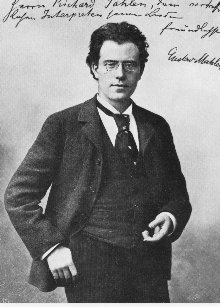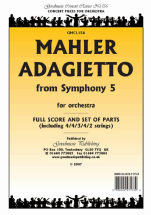Adagietto -from Symphony5
Buy this item (in stock)
Product ID: GM2 CL156
By Gustav Mahler
Publisher:
Goodmusic
Arranger:
orig.
Series:
Concert Classics
Genre:
Romantic Era
Line Up:
String Orchestra
Duration:
9:00
Level: 4
Set & Score
This item is in stock
About this item
The Adagietto from Gustav Mahler's Fifth Symphony is arguably Mahler's most famous single piece of music, and is the most frequently performed extract from Mahler's works. It is best known for its use in the 1971 Luchino Visconti film Death in Venice. However it was frequently performed on its own before then, chiefly because in the early 20th century music programmers did not believe whole Mahler symphonies would be acceptable to audiences. Indeed, the British premiere of the entire Fifth Symphony came thirty-six years after the Adagietto itself had been introduced, by Henry Wood at a Promenade Concert in 1909.
This edition is not arranged or simplified in any way.
Instrumentation
Strings (Violin 1, Violin 2, Viola, Cello, Double Bass) Harp
Reviews and rating
No review available, be the first to write one!

Composer
Gustav Mahler (1860-1911)

Gustav Mahler; 7 July 1860 – 18 May 1911) was a late-Romantic Austrian composer and one of the leading conductors of his generation. He was born in the village of Kalischt, Bohemia, in what was then Austria-Hungary. Kaliště u Humpolce is now in the Czech Republic. Then his family had moved not far to Jihlava where Mahler grew up.
As a composer, he acted as a bridge between the 19th century Austro-German tradition and the modernism of the early 20th century. While in his lifetime his status as a conductor was established beyond question, his own music gained wide popularity only after periods of relative neglect which included a ban on its performance in much of Europe during the Nazi era. After 1945 the music was discovered and championed by a new generation of listeners; Mahler then became one of the most frequently performed and recorded of all composers, a position he has sustained into the 21st century.
More info about the composer...



 Click above to view samples
Click above to view samples
